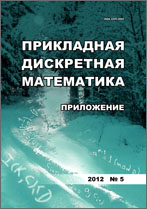|
Theoretical Foundations of Applied Discrete Mathematics
NFS factorization: new hopes
P. Kirchner
French Institute for Research in Computer Science and Automation, Rocquencourt, France
Abstract:
We describe new Number Field Sieve techniques. While none is proved (even under heuristics) to work for a concrete family of number fields, we hope such a family exist. If this is the case, we can factor a special integer $n$ in time $L_n(1/3,(16/9)^{1/3})$, which doubles the length of $n$ with respect to SNFS for the same time. This algorithm works by finding a strongly-ambiguous ideal in order to factor the relative discriminant of a prime degree Galois extension. In case this method can be adapted for factoring general numbers, it may reach a complexity $L_n(1/3,(32/9)^{1/3})$. A variant of the same technique for computing number fields of constant degree $d$ would allow multiplying by $d$ the length of the discriminant at the same complexity. We emphasize that for these running times to hold, we need to build highly specific number fields, and there is no evidence it can be done. Finally, we give another technique for finding the maximum order of number fields, and may run as fast as $L_{|\Delta|}(1/3,(16/9)^{1/3})$. This method is likely to work, and can therefore find some square factors in some numbers.
Keywords:
integer factorization, number field sieve.
Citation:
P. Kirchner, “NFS factorization: new hopes”, Prikl. Diskr. Mat. Suppl., 2018, no. 11, 25–30
Linking options:
https://www.mathnet.ru/eng/pdma386 https://www.mathnet.ru/eng/pdma/y2018/i11/p25
|

| Statistics & downloads: |
| Abstract page: | 175 | | Full-text PDF : | 50 | | References: | 27 |
|




 Contact us:
Contact us: Terms of Use
Terms of Use
 Registration to the website
Registration to the website Logotypes
Logotypes








 Citation in format
Citation in format 